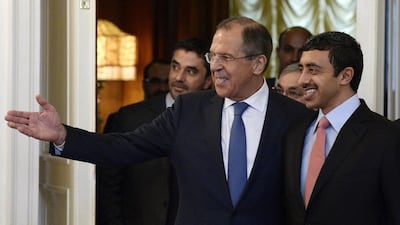Last week, Sheikh Abdullah bin Zayed visited Moscow to discuss the crises in the Middle East, including Yemen, Libya, Syria and Iraq.
The UAE and Russia enjoy strong relations and the Minister of Foreign Affairs’ trip was significant as the Kremlin has the keys to unlock back doors in some of these conflict zones.
Russia can be a negotiator on Syria and can open lines of communication with Iran. On Iraq, the UAE and Russia seek coordination on the counter-terrorism fight and both are striving to properly equip Iraqi security forces.
On Yemen, the countries are working on how best to provide humanitarian aid and, with Libya, Abu Dhabi and Moscow are jointly concerned about the country’s future and are providing support to General Khalifa Haftar and his internationally recognised government in the eastern city of Tobruk.
The UAE, through its ambassador to Russia, Omar Ghobash, understands the Kremlin’s interests. Mr Ghobash has been vocal about the need for Russia’s participation in settling regional issues and promoting stability.
Since 2008, he has been the vital interlocutor between Abu Dhabi and Moscow. He is responsible for UAE investment in Russia growing by Dh22 billion over the past three years, an economic bridge between the two nations that is supported by monthly meetings.
Mr Ghobash has also proposed ideas to fight ISIL’s narratives that are seen as useful by Russia.
He argues that fighting these extremists is a global problem and all countries should be involved in stopping them, particularly when it comes to ideas. This resonates with Russian scholars who have a better understanding of moderate Islam in Arab societies than their western colleagues. And that the UAE sees Russia as a great Christian civilisation fits Abu Dhabi’s view of moderation.
In some parts of the Middle East, Christians are being forced to flee violence or are being murdered by extremists such as ISIL.
Abu Dhabi and Moscow abhor these developments and seek to counter such activity by offering voices of fairness and peace.
But there is more to the relationship. The UAE seeks to invest, for example, in Russia’s infrastructure, as well as in food security programmes.
And Abu Dhabi also sees Russia as a heavyweight player and reliable partner, with great economic and knowledge potential.
In 2013, Abu Dhabi established with the Russian Direct Investment Fund a Dh7bn account to develop infrastructure in Russia’s south.
Soon, Mubadala will invest billions of dirhams in Russia’s agriculture sector.
Simultaneously, Russia seeks to build an air hub in the UAE to deliver aid and knowledge to Africa. This facility is to act as a bridge to Africa, where Russia, with its extensive air cargo-carrying capabilities, can help develop infrastructure and provide health services in areas affected by conflict and famine.
It is interesting to note that Russia and the UAE, through Mubadala, are cooperating to build a US$750 million (Dh2.75bn) airport in Cuba, as well as redeveloping a port and building a railway line in the Caribbean country.
So, ties between the UAE and Russia are robust and well developed in terms of geopolitical and economic engagement and that looks set to continue, with many plans for productive collaboration.
Dr Theodore Karasik is a UAE-based geopolitical analyst and commentator on UAE foreign affairs.
newsdesk@thenational.ae

